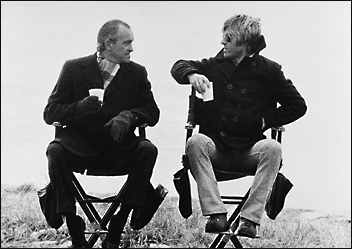Paul Greengrass, the director of The Bourne Ultimatum, “told the Times of London that he purposely tapped into the mistrust the world has of the USA. In my opinion, Mr. Greengrass has used his skills as a filmmaker to create a slick propaganda package that will make him millions of dollars. And standing between Mr. Greengrass and real-life terrorists who would slit his throat are, of course, real-life American intelligence people.

Former CIA director Richard Helms (pictured here with Robert Redford) served as technical advisor on Three Days of the Condor
“In the end, the America-haters will love The Bourne Ultimatum and apolitical others may enjoy the action and carnage. The movie is a perfect storm of mis- guided ideology, silly plotting, and absurd conclusions. In other words, it’s a blockbuster.” — from an 8.9.07 Bill O’Reilly column called “The Bourne Buffoonery.”
O’Reilly is irked because his view of CIA operatives — good fellows looking to protect Americans from the Islamic baddies — sharply conflicts with Bourne‘s portrayal of upper-level CIA guys (Scott Glenn, David Strathairn, Albert Finney) as coldly calculating Machiavellian sociopaths. Well…? Has there been much substantial reporting over the last 45 or 50 years to lend credence to this observation or not? Are pharmacies selling denial pills over the counter these days, or do you still need a prescription?
Mistrust and even loathing of CIA operatives been part of the standard American belief system over the last 35 or 40 years, certainly since the gray paranoia days of the Nixon and Ford administrations in the early to mid ’70s. The first significant Hollywood manifestation was Sydney Pollack‘s Three Days of the Condor (’75). Greengrass and Bourne screenwriter Tony Gilroy (plus the others) are simply drawing from the same mindset 32 years evolved.
